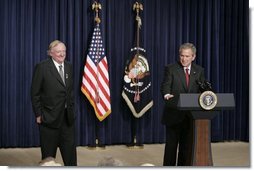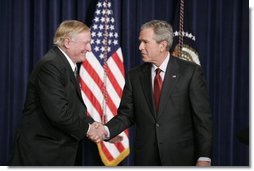THE PRESIDENT: Thanks. I'm here to escort William F. Buckley, Jr., to lunch.
(Laughter.) But first I've got some things I want to say. It's a honor to
celebrate the 50th anniversary of National Review, and soon to be the 80th
birthday of our honoree. You probably think this is a -- the Yale Scholars
Association meeting. (Laughter.) Actually, Bill Buckley did have an influence on
me when I followed him at Yale. You might remember one of his famous quotes,
"The job of conservatives was to stand athwart history, yelling, stop." That's
the approach I took to most of my classes. (Laughter.)
 I
also do want to throw a little bouquet to him, and let him know that all I've
learned about the English language -- (laughter) -- at any rate, it's good to
welcome the Buckley family. Thank you all for coming. It's such an honor to have
you all here. You've got a great family, and you're a family of public service
and a family that has stood strong for what you believe, without wavering. I
appreciate Dr. Kissinger, and Dusty Rhodes and Ed Capano, as well. It's good to
see you all.
I
also do want to throw a little bouquet to him, and let him know that all I've
learned about the English language -- (laughter) -- at any rate, it's good to
welcome the Buckley family. Thank you all for coming. It's such an honor to have
you all here. You've got a great family, and you're a family of public service
and a family that has stood strong for what you believe, without wavering. I
appreciate Dr. Kissinger, and Dusty Rhodes and Ed Capano, as well. It's good to
see you all.
The interesting thing about Bill Buckley's career is he's a -- obviously, not
idle. He likes to do a lot of different things. He was an author, an editor, a
spy novelist, a sailor and a conductor. The most important thing he did was to
contribute to the realm of ideas for America. He was an entrepreneur. He kind of
gathered up some dreamers and decided to do something. A lot of times dreamers
don't do anything, they just sit there and dream. He decided to do something,
and he formed a magazine that helped move conservatism from the margins of
American society into the Oval Office. That's a significant contribution.
The amazing thing is, is that sometimes it's hard to be a leader because you
hear all kinds of voices. He's certainly heard different voices when he formed
the National Review. He had an eclectic group of people. That's a Yale word.
(Laughter.) He had voices that included ex-communists who knew better than most
the threat posed to America by the Soviet Union. He had voices such as free
marketers who knew that markets could deliver better results than bureaucracies.
He had voices from the traditionalists who understood that a government by -- of
and by and for the people could not stand unless it stood on moral ground. They
all different -- represented a different strand of conservative thought. Yet,
when they came together under the conductor's baton, they made beautiful music.
Congratulations for being a leader. (Applause.)
I'm sure it's hard for some of the youngsters -- unfortunately, that doesn't
include me anymore -- (laughter) -- to imagine the day when the only
conservative game in Washington, D.C. was Bill Buckley and the National Review.
And today, we've got, of course, an abundance of conservative columnists and
radio hosts and television shows and think tanks and all kinds of organizations.
I guess in an intellectual sense, you could say these are all Bill's children.
And like children, they grow up and go their own way. But I'm confident that the
faithful advocates of the free enterprise system, like those at the National
Review, regard the competition they have created as a good thing. I certainly
hope so.
 It's
hard to believe that in 1955, the Soviet Union was in full power, that Ronald
Reagan was a Democrat -- and the truth of the matter is, Bill, I was more
interested in Willie Mays than I was in you. (Laughter.) But a lot has changed
in a brief period of time, when you think about it. Many of the more important
changes of the 20th century happened because the National Review stood strong,
and that's a fact -- that's a fact of history.
It's
hard to believe that in 1955, the Soviet Union was in full power, that Ronald
Reagan was a Democrat -- and the truth of the matter is, Bill, I was more
interested in Willie Mays than I was in you. (Laughter.) But a lot has changed
in a brief period of time, when you think about it. Many of the more important
changes of the 20th century happened because the National Review stood strong,
and that's a fact -- that's a fact of history.
I'm glad to know that the people of National Review aren't resting on their
laurels. A sign of a good leader is somebody who can lay the foundation so that
people are able to carry on. I think that's going to be a legacy of Bill
Buckley. He just didn't show up and create something that cratered, he created
something that stood the test of time and grew.
The people of the National Review are determined to leave their mark on this
new century, and we appreciate it. You got a lot of readers here in the West
Wing. My admonition is to keep thinking, to keep writing, and keep working.
I found another Buckley quote interesting -- when he wrote, with
characteristic modesty, that did National Review not exist, no one would have
invented it. (Laughter.) I think it's more accurate to say that only Bill
Buckley could have invented National Review. And that's a tremendous influence
on American life that can be explained only by its unwavering trust and appeal
of human freedom -- this great understanding of the power of freedom to change
societies and to lift up people's lives.
It is an honor to be here to thank you for your service. I want to thank you
for leaving us a magazine and a group of thinkers that will help make the
advance of liberty over the last 50 years look like a dress rehearsal for the
next 50 years.
May God bless the Buckley family. Thank you for coming. (Applause.)
 I
also do want to throw a little bouquet to him, and let him know that all I've
learned about the English language -- (laughter) -- at any rate, it's good to
welcome the Buckley family. Thank you all for coming. It's such an honor to have
you all here. You've got a great family, and you're a family of public service
and a family that has stood strong for what you believe, without wavering. I
appreciate Dr. Kissinger, and Dusty Rhodes and Ed Capano, as well. It's good to
see you all.
I
also do want to throw a little bouquet to him, and let him know that all I've
learned about the English language -- (laughter) -- at any rate, it's good to
welcome the Buckley family. Thank you all for coming. It's such an honor to have
you all here. You've got a great family, and you're a family of public service
and a family that has stood strong for what you believe, without wavering. I
appreciate Dr. Kissinger, and Dusty Rhodes and Ed Capano, as well. It's good to
see you all.  It's
hard to believe that in 1955, the Soviet Union was in full power, that Ronald
Reagan was a Democrat -- and the truth of the matter is, Bill, I was more
interested in Willie Mays than I was in you. (Laughter.) But a lot has changed
in a brief period of time, when you think about it. Many of the more important
changes of the 20th century happened because the National Review stood strong,
and that's a fact -- that's a fact of history.
It's
hard to believe that in 1955, the Soviet Union was in full power, that Ronald
Reagan was a Democrat -- and the truth of the matter is, Bill, I was more
interested in Willie Mays than I was in you. (Laughter.) But a lot has changed
in a brief period of time, when you think about it. Many of the more important
changes of the 20th century happened because the National Review stood strong,
and that's a fact -- that's a fact of history.